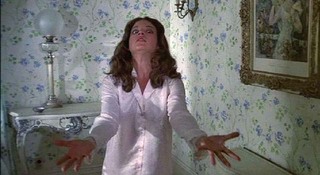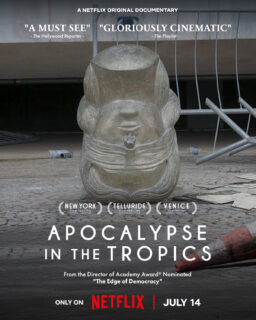
Here’s a question for you: Can a movie ruin a good review? Conversely, can a review actually improve upon a movie? Sure, good criticism (whether positive or negative) should encourage you to see a film in new ways you may not have recognized before. Just as cinema itself is a way of looking at the world through someone else’s eyes, criticism is a way of looking at movies through someone else’s eyes. Yet, the movies themselves don’t change — only our perceptions of them (we’ll put aside William Friedkin’s “French Connection” Blu-ray for the moment). On the one hand, a piece of film criticism is kind of like an adaptation. It offers an interpretation of the original, but does not replace it. Other “versions” still exist, just as they always did.
I can think of several examples of criticism that I think is superior to the work being criticized, in the sense that the critic is writing about an idealized version of what’s on the screen — the movie we might wish was on the screen, rather than (or in addition to) the one that’s actually there. A clarification: This has nothing to do with whether the critic is divining the filmmaker’s intentions or not. It has everything to do with what the critic is seeing in, and getting out of, the film.
I think of Pauline Kael’s intoxicating review of Brian De Palma’s “The Fury.” The movie itself was a bit of a letdown for me after that review, but Kael’s enthusiasm proved infectious. I’m sure I’ve seen “The Fury” at least half a dozen times and it remains one of my favorite De Palmas (and Carrie Snodgress is one of the most heartbreaking of the tender, funny oddball heroines of early-ish De Palma, alongside Sissy Spacek, Betty Buckley, Amy Irving, Genevieve Bujold and Angie Dickinson). Kael’s description of the movie’s climactic crescendo has never left me:
This finale — a parody of Antonioni’s apocalyptic vision at the close of “Zabriskie Point” — is the greatest finish for any villain ever. One can imagine Welles, Peckinpah, Scorsese, and Spielberg still stunned, bowing to the ground, choking with laughter.
Well, once that image has been implanted in your head to accompany the one(s) in the movie (and the villain is John Cassavettes, so there’s even more auteur glee on display), it’s hard to shake it. The best criticism can become a kind of poetry that does with art what earlier generations of poets did with nature: by analyzing and reimagining it, they cast their own imprint upon it. I can’t think of Max Ophuls — or the moral values implicit in camera movement itself — without remembering Andrew Sarris’s evocation of a moment from “Letter From an Unknown Woman” in The American Cinema: Directors and Directions, 1929 – 1968:
His fluid camera follows his characters without controlling them, and it is this stylistic expression of free will that finally sets Ophuls apart from Murnau and Hitchcock…. In the final analysis, Ophuls is, like all great directors, inimitable, and if all the dollies and cranes in the world snap to attention when his name is mentioned, it is because he gave camera movement its finest hours in the history of the cinema. When Joan Fontaine mounts the staircase to her lover’s apartment for the last time, Ophuls’s camera slowly turns from its vantage point on a higher landing to record the definitive memory-image of love. For a moment we enter the privileged sanctuary of remembrance, and “Letter from an Unknown Woman” reverberates forever after with this intimation of mortality. Love, the memory of love, the mortality of love comprise the Ophulsian heritage.
Those words echo in my brain in ways that enhance Ophuls’ haunting imagery. Likewise, I can’t think of “The Godfather, Part II” without recalling Kael’s image: “About midway, I began to feel that the film was expanding in my head like a soft bullet.” I read that before I saw the movie, but I understood what she was saying. I don’t know if my experience of the movie was altered by it, but it felt like a confirmation of it:
Structurally, the completed work is nothing less than the rise and decay of an American dynasty of unofficial rulers. Vito rises and becomes a respected man while his son Michael, the young king, rots before our eyes, and there is something about actually seeing the generations of a family in counterpoint that is emotionally overpowering. It’s as if the movie satisfied an impossible yet basic human desire to see what our parents were like before we were born and to see what they did that affected what we became — not to hear about it, or to read about it, as we can in novels, but actually to see it. It really is like the past recaptured.
Kael implicitly evokes Proust, explicitly cites Tolstoy (elsewhere in the same piece), and imagines the “Godfather” films as a kind of epic “Up!” documentary focusing on the Corleone family. She loves the first “Godfather” film (even calls it “the greatest gangster picture ever made”) but fully recognizes the maturity of vision that “Part II” brings to it, retroactively transforming a gangster movie into something much darker, deeper and more ambitious. (Upon reflection, it’s also a maturity that, sadly, Francis Ford Coppola has never again approached, which adds another strain of tragic melancholy to the familial saga.)
Passages from reviews and essays like these can frame or re-frame movies, or auteurs’ bodies of work, for us indelibly. We may still be able to see these pictures in new ways, with fresh eyes, but the words of the poets critics may have forever colored our experience, whether we consciously remember them or not.
I started off this post thinking about reviews of movies that are in some way “better” than the movies themselves — that is, criticism that in some way elevates a movie, even if you or I are disappointed in the movie itself. I was thinking of Manohla Dargis’s magnificent review of “There Will Be Blood,” which captures the chill, the terror, the excitement, the coursing of blood in ways that fill me with awe. Every time I read it, it rekindles hopes that are only dashed by another first-hand encounter with the movie itself. (Cue Yukon Cornelius: “Nothin’.)
Just last weekend, though, I had a different kind of encounter that made me reappraise the things people so often say about pans, like, “I liked your review so much I don’t even need to see the movie,” or, “Your review is more fun than the movie could ever be.” There are critics (mostly bad ones) who have built their entire careers on attempting to elicit such reactions. But I appreciated A.O. Scott’s take on Sam Mendes‘ “Away We Go” so much that I’m hesitant to see the movie only because, from having seen Mendes’s other movies, I think it’s most likely all downhill from here:
The smug self-regard of this movie, directed by Sam Mendes from a script by Dave Eggers and Vendela Vida, takes a while to register, partly because Ms. Rudolph and Mr. Krasinski are appealing and unaffected performers and partly because the writing has some humor and charm. […]
To observe that they inhabit no recognizable American social reality is only to say that this is a film by Sam Mendes, a literary tourist from Britain who has missed the point every time he has crossed the ocean. The vague, secondhand ideas about the blight of the suburbs that sloshed around “American Beauty” and “Revolutionary Road” are now complemented by an equally incoherent set of notions about the open road, the pioneer spirit, the idealism of youth.
Or something. Really, “Away We Go” is about the flight from adulthood, from engagement, from responsibility, even as it cleverly disguises itself as a search for all those things. But the dream of being left alone in a world of your own making, far from anything sad or icky or difficult, is a child’s fantasy. Not an unattractive or uncommon one, it must be said, and for that reason it is tempting to follow Burt and Verona into the precious, hermetic paradise that awaits them at the end of the road. You know they will be happy there. But you should also understand that you are not welcome. Does it sound as if I hate this movie? Don’t be silly. But don’t be fooled. This movie does not like you.
OK, maybe I feel that I’ve already seen the movie now, having visited Mendes’ antiseptically dyspeptic “America” several times before. Or maybe I feel that Scott has taken the wind out of my sails: No matter how much the movie may annoy me, I’m pretty sure it will annoy me in the same ways other Mendes movies have annoyed me, which is exactly what’s wrong with them. (A film critic friend observed that “Revolutionary Road” lost him with the oh-so-clever shot of all the men in gray — flannel? — suits and hats coming at the camera in a too-literal, theatrically choreographed chorus line. That’s precisely the sort of hamfisted touch that smashes Mendes movies dead.)
Care to contribute some anecdotes of your own about your experience with great criticisms of maybe not-so-great movies, and how they colonized your subconscious? (Quick: What movie is that from?) Has a movie ever spoiled a review for you? Does the criticism sometimes stand up, even if the movie doesn’t? Or is the fate of one inextricably linked to the other?
UPDATES: Apologies for the strikethrough error! I typed /stroke instead of /strike in the wee small hours and mucked up the HTML. Many thanks to those who alerted me.
Girish calls attention to this Ray Sawhill 1989 interview with Pauline Kael, in which Sawhill says of her work (in an engagingly Kaelian second-person):
You come away buzzing; you take it personally — in ways you’re not used to taking nonfiction. (“Why doesn’t she like Tarkovsky’s or Sirk’s films as much as I do?”) Her reviews are so persuasive that when you don’t agree with her you can go around for days arguing with her in your head.










